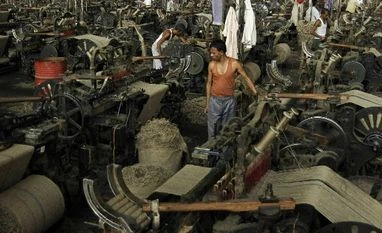While jute mills have been tasked with supplying bags worth about Rs 1,500 crore to different states ahead of Rabi harvesting, the West Bengal government’s relaxation to allow them operate with 15 per cent workforce, will enable them to meet just 15-20 per cent of total demand.
After MHA guidelines allowing certain industries to operate, West Bengal chief minister Mamata Banerjee today said jute mills can operate at 15 per cent workforce on alternative days.
Various state governments have been requesting the West Bengal government to open the jute mills ahead of the harvesting season.
The Indian Jute Mills Association (IJMA) is also planning to make a representation to the government for more relaxation.
“Allowing 15 per cent of workforce is much lower than (the actual) requirement, and with this jute mills will not be able to meet even 20 per cent of their commitments. We are writing to the government for more relaxations,” said a jute mill owner.
May is the peak time for these mills as jute bag packaging is mandatory for food grains. Also, up to 20 per cent of sugar packaging has to be done in jute bags. The mills have a pending order book of processing close to 600,000 bales of jute. This apart, jute mills are also getting a number of export enquires, but are unable to meet the demand.
Meanwhile, mill workers are raising concerns over non-payment of dues during the lockdown period.
During the past three weeks, the pending wage bill of jute mill workers has been close to Rs 250 crore, according to Raghav Gupta, Chairman, IJMA (Indian Jute Mills Association). During the same period, revenue loss is close to Rs 700 crore, he added.
Earlier the Union textiles ministry had sent a list of jute mills to open, with 25 per cent staff strength—a proposal shot down by the state government. Also, the Central government had recommended 12-hour shifts instead of 8-hour shifts for the workers. This was meant to avoid overcrowding during changeover.
According to Sanjay Kumar Rai, general secretary, TMC Jute and Textiles Workers Association, the workers should be paid at least 75 per cent of their wages during lockdown as stipulated by Industrial Dispute Act, he said.
There are about 43 operational composite operational jute mills in West Bengal. A number of mills fall in the locality of Howrah, which has reported high number of Covid 19 cases.
Apart from domestic demand, over the years, demand for finished jute products have increased in the overseas markets, particularly the US. India also exports jute bags to several coffee producing countries. Exports have grown from 30 million in 2013-14 to 56 million in FY19.
“Jute mills are thinking of staggered production once it reopens. There is a lot demand for jute bags, even in Covid 19 affected countries. However, the problem is with manufacturing,” said D C Baheti, executive director, Gloster Jute Mill.
Unlock 30+ premium stories daily hand-picked by our editors, across devices on browser and app.
Pick your 5 favourite companies, get a daily email with all news updates on them.
Full access to our intuitive epaper - clip, save, share articles from any device; newspaper archives from 2006.
Preferential invites to Business Standard events.
Curated newsletters on markets, personal finance, policy & politics, start-ups, technology, and more.
)